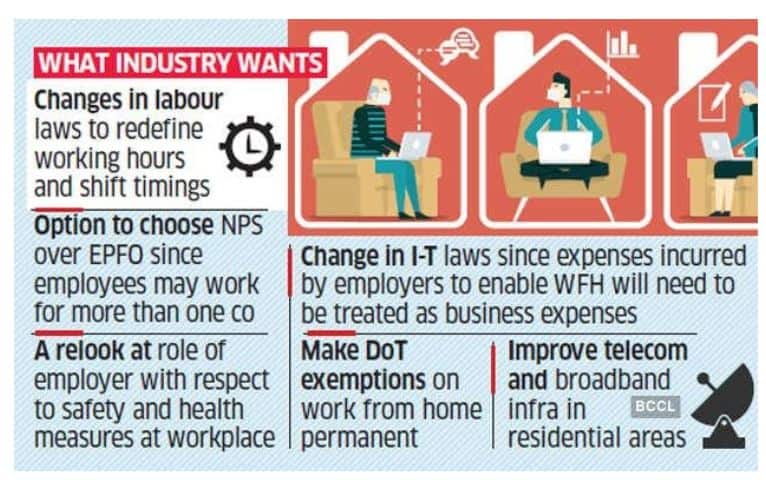The Big Picture- RSTV, UPSC Articles
Changing Labour and Tax Laws
Archives
TOPIC: General Studies 2
- Labour reforms
In News: The information technology industry has approached the central government ministries to flesh out changes to taxation and labour laws in line with the work-from-home model.
The ongoing Covid-19 pandemic has impacted the economy in more ways than one, including the way in which business and life as we know it is conducted. In an effort to stay buoyant, every organization has enabled a wealth of mitigatory measures including adopting the virtual approach in the least disruptive manner.
While the coronavirus pandemic forced offices to migrate to WFH, many are expected to continue this even once a solution for the current health crisis emerges.
- At least 4.3 million IT workers or half the sector’s workforce would WFH permanently, according to estimates. Industry body Nasscom has been tasked with preparing a detailed report, after which it will go to relevant ministries such as department of telecom and the labour ministry for action.
- The government categorised the IT industry as essential services and permitted exemptions similar to those granted to units in SEZs and STPIs by the department of telecom.
- The successful transition is now prompting large-scale shifts in work models across the industry, with India’s largest IT services firm Tata Consultancy Services (TCS) looking at 75% of its workforce working remotely by 2025.
The Industry’s Perspective
The industry has also requested the government to make permanent several recent concessions extended until July, including relaxation of telecom regulations that allow back-office companies to work from home and move equipment out from designated special economic zones to facilitate remote working.
- Some of the labour laws may not cater to a work-from-home environment, so (we) need to start looking through a fresh lens
- Labour laws should be amended in a way to safeguard employees while also providing flexibility to employers.
- Once work from home is enabled at a large scale, people may want to work for only a certain number of hours a day, as opposed to the norm of 8 hours a day; this could benefit women, university students and handicapped greatly
- As working from home catches up, people could work for two or even three companies at the same time. So, the government will need to let employers and workers choose NPS (National Pension Scheme) instead of EPFO as a social security scheme, as in NPS a worker can be an employee today and a gig worker tomorrow
- Current labour laws will need to be revisited to provide industry the flexibility to enable working hours and shift timings.
- The role of employer with respect to safety and health measures at the workplace will require a rethink as the home becomes the new workplace. Most organisations will break away from large campuses to distributed centres. Work from home doesn’t mean work from home forever. There will be a Friday meeting, etc. But instead of my campus being 10,000 people in one place, it can be 500 people in a smaller town.

Source: Click here
Experts are of the view that a shift to a WFH model delivers gains to both the industry and to society as metros are decongested with lower migration from tier II and III cities that could lead to reduced carbon footprint.
The Challenges
Workspace: As the home environment is not designed to be the replica of the work environment, there are unique challenges in terms of identifying a workstation or conducting work without distractions.
Productivity: Productivity and focus are far more challenging for employees who are staying in small paying guest or co-living developments owing to the complexities of the shared space.
The belongingness: The office environment is one that will also nurture a shared sense of purpose and camaraderie for employees, thereby having a positive impact on productivity. Although Work from Home offers relief from commute, businesses can be more efficiently run in a demarcated office setup. This will enable the CRE fraternity to find a bridge between the workspace and the work-from-home space. The demarcated office setup can help improve talent management and the collaborative work experience among other concerns.
Data: Data security, during Covid-19 poses a major concern as people working from home are exposed to social engineering and phishing risks and are more likely to use potentially vulnerable services, thus jeopardising the integrity of both the individual and the organization. Data confidentiality is another impeding factor as many firms have client-related restrictions to avail work from home.
Mental Health: Research reveals that prolonged duration of working remotely without socializing can adversely impact the mental wellbeing of employees. A framework needs to be developed wherein employees are amply supported such to incorporate physical activity, meditation and creative activities in the interest of wellness
Fostering Innovation: With the pace of business changing the way it has, organizations are focused on reinventing themselves continuously. In the workplace, we typically have greater access to technology, interactions with our fellow colleagues, subordinates and a stronger cultural connection—all of which make innovation easier and drive the business forward.
Connecting the Dots:
- Can work from home be the new normal for India? Comment.
- Discuss the challenges associated with the work-from-home model.













